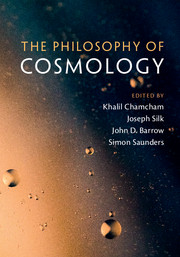Book contents
- Frontmatter
- Contents
- List of Contributors
- Preface
- Acknowledgments
- Part I Issues in the Philosophy of Cosmology
- Part II Structures in the Universe and the Structure of Modern Cosmology
- Part III Foundations of Cosmology: Gravity and the Quantum
- Part IV Quantum Foundations and Quantum Gravity
- 14 Is Time's Arrow Perspectival?
- 15 Relational Quantum Cosmology
- 16 Cosmological Ontology and Epistemology
- 17 Quantum Origin of Cosmological Structure and Dynamical Reduction Theories
- 18 Towards a Novel Approach to Semi-Classical Gravity
- Part V Methodological and Philosophical Issues
- Index
- References
15 - Relational Quantum Cosmology
from Part IV - Quantum Foundations and Quantum Gravity
Published online by Cambridge University Press: 18 April 2017
- Frontmatter
- Contents
- List of Contributors
- Preface
- Acknowledgments
- Part I Issues in the Philosophy of Cosmology
- Part II Structures in the Universe and the Structure of Modern Cosmology
- Part III Foundations of Cosmology: Gravity and the Quantum
- Part IV Quantum Foundations and Quantum Gravity
- 14 Is Time's Arrow Perspectival?
- 15 Relational Quantum Cosmology
- 16 Cosmological Ontology and Epistemology
- 17 Quantum Origin of Cosmological Structure and Dynamical Reduction Theories
- 18 Towards a Novel Approach to Semi-Classical Gravity
- Part V Methodological and Philosophical Issues
- Index
- References
Summary
Conceptual Problems in Quantum Cosmology
The application of quantum theory to cosmology raises a number of conceptual questions, such as the role of the quantum-mechanical notion of “observer” or the absence of a time variable in the Wheeler–DeWitt equation. I point out that a relational formulation of quantum mechanics, and more in general the observation that evolution is always relational, provides a coherent solution to this tangle of problems.
A number of confusing issues appear when we try to apply quantum mechanics to cosmology. Quantum mechanics, for instance, is generally formulated in terms of an observer making measurements on a system. In a laboratory experiment, it is easy to identify the system and the observer: but what is the observer in quantum cosmology? Is it part of the same universe described by the cosmological theory, or should we think of it as external to the universe? Furthermore, the basic quantum dynamical equation describing a system including gravity is not the Schrödinger equation, but rather the Wheeler–DeWitt equation, which has no time parameter: is this related to the absence of an observer external to the universe? How do we describe the quantum dynamics of the universe without a time variable in the dynamical equation and without an observer external to the universe?
I suggest that clarity on these issues can be obtained by simply recognizing the relational nature of quantum mechanics and more in general the relational nature of physical evolution. In the context of quantum theory, this nature is emphasized by the so-called relational interpretation of quantum mechanics (Rovelli, 1996). The relational nature of evolution, on the other hand, has been pointed out by the partial-observable formulation of general covariant dynamics (Rovelli, 2002).
A central observation is that there is a common confusion between two different meanings of the expression “cosmology”. This is discussed below, in Section 15.1.1. A considerable amount of the difficulties mentioned above stems, I argue, from this confusion. The discussion clarifies on the role of the quantum mechanical observer in cosmology, which is considered in Section 15.1.2. In Section 15.2, I briefly describe the relational interpretation of quantum mechanics and some related aspects of quantum theory.
- Type
- Chapter
- Information
- The Philosophy of Cosmology , pp. 297 - 316Publisher: Cambridge University PressPrint publication year: 2017
References
- 7
- Cited by

